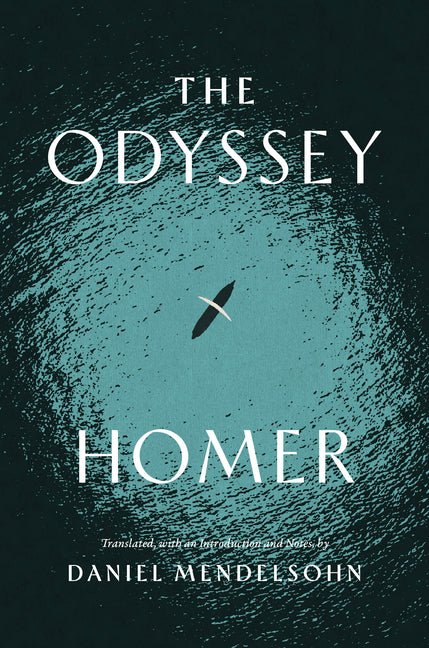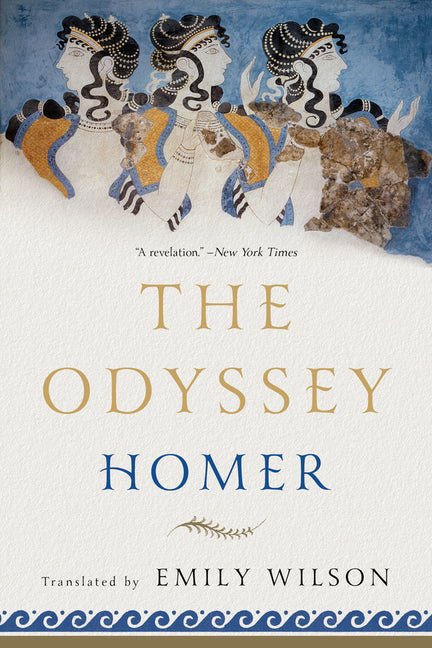The Odyssey
by Homer
*When you open this audiobook on Libro.fm, be sure to select Aveson as your bookstore so that your purchase supports local literacy programs and tree‑planting.
Couldn't load pickup availability
"This may be the best translation of The Odyssey yet." The Telegraph
A magnificent feat of translation, hailed by classicists and poets alike as a "momentous achievement" "thrilling," "rich and rhythmical," "superb," "mesmerizing," "searingly faithful--yet absolutely original."
With this edition of Homer's Odyssey, the celebrated author, critic, and classicist Daniel Mendelsohn brings the great epic to vividly poetic new life. Widely known for his essays on classical literature and culture in The New Yorker and many other publications, Mendelsohn gives us a line-for-line rendering of The Odyssey that is both engrossing as poetry and true to its source. Rejecting the streamlining and modernizing approach of many recent translations, he artfully reproduces the epic's formal qualities--meter, enjambment, alliteration, assonance--and in so doing restores to Homer's masterwork its archaic grandeur. Mendelsohn's expansive six-beat line, far closer to the original than that of other recent translations, allows him to capture each of Homer's dense verses without sacrificing the amplitude and shadings of the original.
The result is the richest, most ample, most precise, and most musical Odyssey in English, conveying the beauty of its poetry, the excitement of its hero's adventures, and the profundity of its insights. Supported by an extensive introduction and the fullest notes and commentary currently available, Daniel Mendelsohn's Odyssey is poised to become the authoritative version of this magnificent and enduringly influential masterpiece.
Share
Book Details
ISBN:
9780226604428
EAN:
022660442X
Binding:
Hardcover
Pages:
560
Authors:
Homer
Publisher:
University of Chicago Press


The introduction is worth the price of book. Profoundly stunning! I love this translation.
Excellent new translation with helpful notes and introductory material.
👍
Wonderful translation. Very readable.
COMPETITION. On September 13, 2017, Emily Wilson’s review of Daniel Mendelsohn’s book “An Odyssey: A Father, a Son, and an Epic” was published in the Guardian newspaper. She called this work a “brilliant new memoir/lit-crit essay” and Mendelsohn “a perceptive literary critic and a self-consciously elegant writer.” In November the same year, Wilson’s translation of the Odyssey appeared to great popular acclaim. In 2019, she was awarded a MacArthur Fellowship. In January of 2018, Daniel Mendelsohn embarked on a more than 6-year long project of translating the Odyssey, published in April of 2025. For this work, too, praise was immediate and plentiful, mainly (so far) from members of academia and scholarly writers. One of the first reviewers, Edith Hall, gushes: “This may be the best translation of The Odyssey yet.” In his Note on the Translation, Mendelsohn did not return the compliment that Wilson had graciously bestowed on his earlier book. In fact, Edith Hall calls Mendelsohn’s critique of Wilson’s version “slightly dyspeptic,” a cute scholarly adjective somewhere between bad tempered and petulant. Why dyspeptic? With some relish, Mendelsohn quotes one of Wilson’s reviewers who had had written that “her poem is shorter than the original by a third,” which Mendelsohn interpreted as meaning that by shortening it, “the poem as a whole loses much of its subtlety and texture.” With this quote, he has thrown down the gauntlet.CONTRAST. Can we even compare the two translations, Wilson v. Mendelsohn? One can certainly show where they differ. My limited, but (I believe) representative testing ground will primarily be the first ten lines of the first book. Let’s look: Which words are being used, which meter, which poetic devices? Which tone or “voice” is thus created for the listener/reader? Finally, what is the translator’s (not the poet’s) purpose and achievement, taking the grand view from above?VOCABULARY. The first important decision a translator of Homer’s Odyssey has to make is how to render the term polýtropos. It is the first adjective given to the man, whose name (Odysseus) hasn’t been mentioned yet. Which English word one uses for this attribute is so important because it strikes a first chord for what is to come. (Just think of the signal function of the heroic double E flat major chord, tutti and fortissimo, at the outset of Beethoven’s Eroica.) The literal dictionary meaning of polýtropos is “many-turned,” also “much-travelled,” from where it is a short distance to “turning many ways” and metaphorically to shifty, versatile, wily. Lattimore wrote “man of many ways,” Fagles “man of many turns,” Fitzgerald “skilled in all ways of contending,” Rodney Merrill “versatile and resourceful,” Butler “ingenious,” Peter Green the equally short “resourceful.” Pope in 1726 offered “(the man) for wisdom’s various arts renown’d.” The early German, and still most often quoted translation by Voss (1781) went back to the dictionary and picked “much-travelled” (vielgewandert). Quite popular became “vielgewandt” by Schadewaldt, Emil Staiger, and others, a neologism that combines versatility and flexibility with craftiness. In other languages one finds, for instance: multiforme, versatile; ingegnio, astuto; l’homme aux mille ruses, homme aux mille tours; in Japanese tasainaru otoko = a man with many talents. No doubt aware of these possibilities, both Wilson and Mendelsohn made courageous and original decisions. For Wilson, the first attribute by which she introduces Odysseus is “complicated:” “Tell me about a complicated man.” That is new and fresh, a four-syllable chord just like polýtropos. Somewhat ambivalent, it leaves open how clever, versatile, wily, crafty, involved, etc., Odysseus will show himself later in his adventurous homecoming. Mendelsohn introduces Odysseus with “a man (…) who had so many roundabout ways (to wander …).” This phrase is not a harmonic chord but more like a melodic motif or motivic gesture like the four initial notes in Beethoven’s Fifth. It hints at the coming vagaries and wandering and also to twists and turns in the hero’s character. (Unfortunately, in the UK a roundabout is a road junction at which traffic moves in one direction around a central island, making traffic lights unnecessary.) The term polýtropos shows up one more time in Book 10.330. There, Wilson abandons her “complicated”, it doesn’t fit with Circe’s characterization of Odysseus. Instead, she chooses “the man who can adapt to anything.” Mendelsohn sticks with “the man of the roundabout ways,” which is odd in the context. The most descriptive words for Odysseus are spoken by his guardian goddess Athene. Wilson writes in Book 13.291-5 (I’m leaving out the verse-formatting): “To outwit you in all your tricks, a person or a god would need to be an expert at deceit. You clever rascal! So duplicitous, so talented at lying! You like fiction and tricks so deeply you refuse to stop even in your own land ….” In Mendelsohn’s transla...



